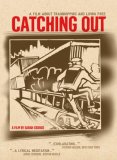| Reviews & Columns |
|
Reviews DVD TV on DVD Blu-ray 4K UHD International DVDs In Theaters Reviews by Studio Video Games Features Collector Series DVDs Easter Egg Database Interviews DVD Talk Radio Feature Articles Columns Anime Talk DVD Savant Horror DVDs The M.O.D. Squad Art House HD Talk Silent DVD
|
DVD Talk Forum |
|
|
| Resources |
|
DVD Price Search Customer Service #'s RCE Info Links |
|
Columns
|
|
|
Catching out: A Film About Trainhopping and Living Free
Without becoming a character herself, George principally documents four train hoppers through their own words: Switch and Baby Girl, a twenty-something couple with proletarian roots who met in a California soup kitchen; Jessica, a young UC Berkeley dropout raised by a hippy vagabond mom; and, Lee, a middle-aged, introspective eco-anarchist raised in an upper-middle-class household. The first half of Catching Out consists of interviews with these free spirits largely in open boxcars moving through desolate stretches of the American West.
At the time of their first interview, Switch and Baby Girl are probably the closest in circumstance to the traditional stamp tramps of bygone days. They're poor people with limited opportunities whose only options within the world of paychecks and fixed abodes are dead-end jobs and substandard rentals. Switch & Baby Girl muse on their decision to forgo striving for the American Dream:
Switch: I feel a lot freer than the average person. I don't have the worry about the bills, and the rent, and the materialistic things.Switch and Baby Girl are the train hoppers I worry most about. They're vulnerable in ways that Jessica and Lee are not. Revelations in the follow-up interview in the second half of the film partially confirms and partially assuages my worries.Baby Girl: We live with the very basics, and people think there's something wrong with us; we have to be converted, or helped, or treated. You don't need the world, you just need the basic--food, air, shelter, and love.
There's general agreement that the days of the train tramps and hobos are rapidly coming to a close. Increased security concerns, consolidated freight ownership, and less permissive attitudes have combined to increase enforcement and discourage train hopping. Like most of those in what is likely the final large wave of train hoppers, Jessica proudly counts herself as a punk. For Jessica, being a punk means that she can walk into any town in America and find another punk that will give her something to eat and a place to stay. When Sarah George first interviews Jessica she's just dropped out of UC Berkley undergrad and is train hopping with a boyfriend. Though she's in the same circumstances as Baby Girl--traveling the rails with a boyfriend, with no certain future plans--it's immediately obvious that Jessica has options that Baby Girl never will. There's little doubt that Jessica will be able to move on to a comfortable, yet still bohemian life, when she chooses to do so.
Lee is a mix of iconic hobo-philosopher and modern eco-anarchist. During the initial interview with Lee we learn that he logs more than 10,000 miles on the rails a year, and considers train hopping "one of those few genuinely American things like jazz, or having sex in cars." He takes great pleasure in the "deep conversations that people on the trains [share]." Lee is fiercely anti-consumerist. He places great value in not being in thrall to materialism. Of the four principal interviewees, Lee is the most likely to remain happily on the periphery of the mainstream culture all his days.
After the two weeks of principal photography wrapped, Sarah George continued to work on Catching Out as time and money permitted. Over a period of several years, she revisited Jessica, Lee, and Switch and Baby Girl, interviewed other rail riders, attended a west coast gathering of train hoppers, and shot additional b-roll of trains and rail yards. The interviews with additional train hoppers and the gathering feel like add-ons to pad out the time to get it to the feature-length runtime of 79 minutes, but the supplementary interviews with Switch, Baby Girl, Jessica and Lee are useful in covering a dramatic change of circumstances for Switch and Baby Girl, and in providing greater depth in the backgrounds and motivations of Jessica and Lee. Although this material is interesting, the transition from the interviews aboard the moving trains to the interviews in apartments and houses is a letdown.
The Video:
Catching Out was shot on Super 16mm negative and then blown up to a 35mm print. The film has deeply saturated colors and a terrific grainy look. No doubt Catching Out looks very good when it's theatrically projected. Unfortunately, the DVD distributor, Microcinema International, did not anamorphically enhance the image for the DVD.
There are no subtitles on this release.
The Audio:
The 2.0 Dolby Digital audio is distortion free, and dialogue is easy to understand.
The Extras:
Extras consist of a theatrical trailer, a music video, five additional short scenes, production stills, and a short making-of featurette narrated by George documenting how the train hopping footage was shot.
Final Thoughts:
Catching Out has many fine moments capable of prompting reconsideration of what constitutes the good life. Though Catching Out would have benefited from a tighter edit, it is worth seeing by viewers interested in meditations on the human condition, especially explorations of fringe lifestyles.
|
| Popular Reviews |
| Sponsored Links |
|
|
| Sponsored Links |
|
|
| Release List | Reviews | Shop | Newsletter | Forum | DVD Giveaways | Blu-Ray | Advertise |
|
Copyright 2024 DVDTalk.com All Rights Reserved. Legal Info, Privacy Policy, Terms of Use,
Manage Preferences,
Your Privacy Choices | |||||||















